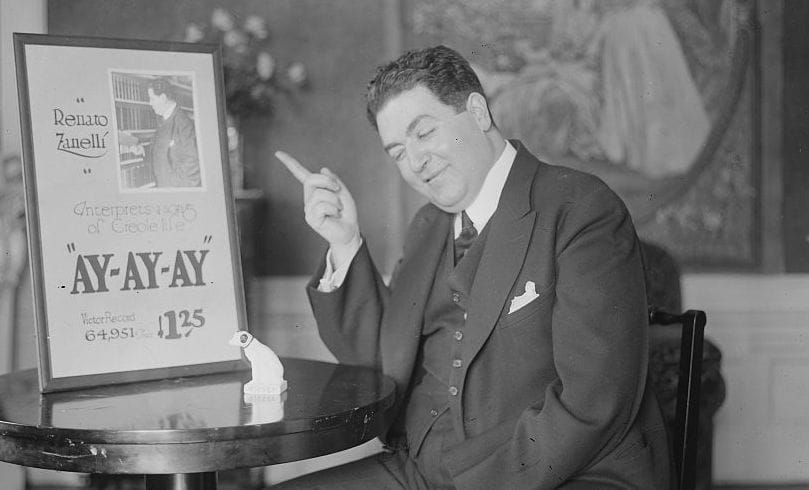Renato Zanelli: The Great Chilean Opera Singer

Chile, in South America, has produced a handful of operatic singers in the last century, like Sofia del Campo, Carlo Morelli and Ramón Vinay. Among these, stands out the name of Renato Zanelli who enjoyed a fine career in the most important opera houses in the world during a period full of rivals—baritones Giuseppe De Luca, Pasquale Amato, Giuseppe Danise and tenors Aureliano Pertile, Giovanni Martinelli, Giacomo Lauri-Volpi. Zanelli was considered the best Otello in his time and was heir to Francesco Tamagno, Leo Slezak and Giovanni Zenatello.
Zanelli was born in Valparaíso in central Chile on 1 April 1892. He had five brothers and one sister, all of whom studied music. However, only two of them were destined for the operatic stage: Zanelli and his brother Carlos, who later changed his name to Carlo Morelli.
On completing his education in Switzerland and Italy, Zanelli returned to Chile to take care of the family business. However, singing, which happened to be a pleasant amateur interest, began to be taken more seriously under the guidance of a leading Chilean teacher. By 1916, Zanelli made his debut in Santiago as a baritone playing Valentine in Faust which was followed sometime later by performances as Conte di Luna in Il Trovatore and Tonio in Pagliacci.
Seeing the need for more experience, Zanelli left for the US, where he gave a few concerts before auditioning for the noted opera manager Giulio Gatti-Casazza, who was pleased by what he heard and engaged him for the 1919-20 season at the Metropolitan Opera in New York. In November, a performance of Aida with Giovanni Martinelli, Claudia Muzio and Gabriella Besanzoni introduced him to the Metropolitan audiences. He also sang in Pagliacci with Enrico Caruso, in La forza del Destino with Rosa Ponselle and in Le Coq d’Or opposite Maria Barrientos.
Zanelli then went to Chicago to sing Escamillo (Carmen), Tonio and di Luna. At the end of the season, he undertook a tour of American cities, after which he returned to his native land.
After his time in the US, Zanelli felt that his voice lacked some resources expected of a first-class baritone. He sought assistance in Italy with leading teachers who convinced him to be a tenor. An intensive period of study followed, after which he made his debut as Raoul in Les Huguenots at Naples in 1924. The change from being a baritone to tenor was not easy yet he eventually emerged as a tenor of the first rank.
He first attempted Otello at Turin in 1926. It was not much of a success. Realising that the only way to succeed is to study the part intensely, he did what was needed and in 1928, the long-awaited triumph was his. This was also the year in which Covent Garden heard him as the Moor with Giovanni Inghilleri as Iago. A repeat performance in 1930 was with Margaret Sheridan and Mariano Stabile as Iago.
Zanelli was hailed as the legitimate successor to Giovanni Zenatello, whose classic interpretation of Otello in 1926 was very vivid and Zanelli was one of the few singers to whom the role could be entrusted with confidence. Success followed in South America and Milan’s La Scala during the seasons from 1929 to 1933.
He sang in Lohengrin, Die Walküre and Tristan und Isolde in Italian. Further, he sang the tenor parts from Carmen, Norma, La Forza del Destino, Andrea Chénier, La Traviata, Pagliacci and Aida.
In 1934 he returned to the US as a tenor. However, apart from some concerts, he was unable to sing as he was diagnosed with cancer. He returned to Chile where his condition deteriorated rapidly.
On 25 March 1935 he passed away and was laid to rest in Santiago. Richard Capell, of the Daily Mail, wrote: “The dramatic vividness of Zanelli’s Otello was something rarely seen on the operatic stage. He held the eye, he held one’s sympathies. This Otello, one knew, was truly a commander, a man out of the ordinary, his movements spoke of active blood and a proud mind. The greatest heroic ring may not be in Zanelli’s voice, yet this true artist made his veiled, compressed, cello-like tone seem characteristic of Otello’s nature. Yes, a great Otello worthy of the wonderful part, the hardest and the grandest in all opera.”
LPs of Zanelli, which include four selections from Otello, are part of the Stuart-Liff Collection.
By Jimmy Bilimoria. This piece was originally published by the National Centre for the Performing Arts, Mumbai, in the April 2024 issue of ON Stage – their monthly arts magazine.






